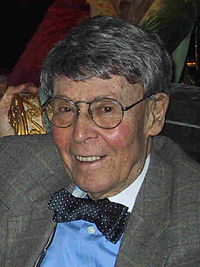De Evia
| Edgar de Evia | |
|---|---|

Edgar de Evia circa 2002
|
|
| Born |
Edgar Domingo Evia y Joutard July 30, 1910 Mérida, Yucatán, Mexico |
| Died | February 10, 2003 (aged 92) New York, New York, U.S.A |
Edgar Domingo Evia y Joutard, known professionally as Edgar de Evia (July 30, 1910 – February 10, 2003), was a Mexican-born American interiors photographer.
In a career that spanned the 1940s through the 1990s, his photography appeared in magazines and newspapers such as ' House & Garden, Look and The New York Times Magazine and advertising campaigns for Borden Ice Cream and Jell-O.
Edgar served as the research assistant to Dr. Guy Beckley Stearns, a homeopathic physician with whom he wrote and published articles and one book about homeopathy.
For Laurie's Domestic Medicine, a medical guide published in 1942, Stearns and Edgar D. Evia contributed an essay called "The New Synthesis", which was expanded that same year into a book entitled "The Physical Basis of Homeopathy and the New Synthesis". In the New England Journal of Homeopathy (Spring/Summer 2001, Vol. 10, No. 1), Richard Moskowitz, MD, called the Stearns-Evia article "a cutting-edge essay into homeopathic research that prophesied and actually began the development of kinesiology, made original contributions to radionics, and dared to sketch out a philosophy of these still esoteric frontiers of homeopathy at a time when such matters were a lot further beyond the pale of respectable science even than they are today."
Frequently producing images utilizing soft focus and diffusion, de Evia was dubbed a "master of still life" in the 1957 publication Popular Photography Color Annual. In a review of the book, The New York Times stated that "Black and white [photography] is frequently interspersed through the book and serves as a reminder that black and white still has a useful place, even in a world of color, often more convincingly as well. This is pointed up rather persuasively in the portfolio on Edgar de Evia as a 'master of still life' and in the one devoted to the work of Rene Groebil." "Editorial high-key food photography was introduced by Edgar D'Evia in 1953 for the pages of Good Housekeeping."
...
Wikipedia
